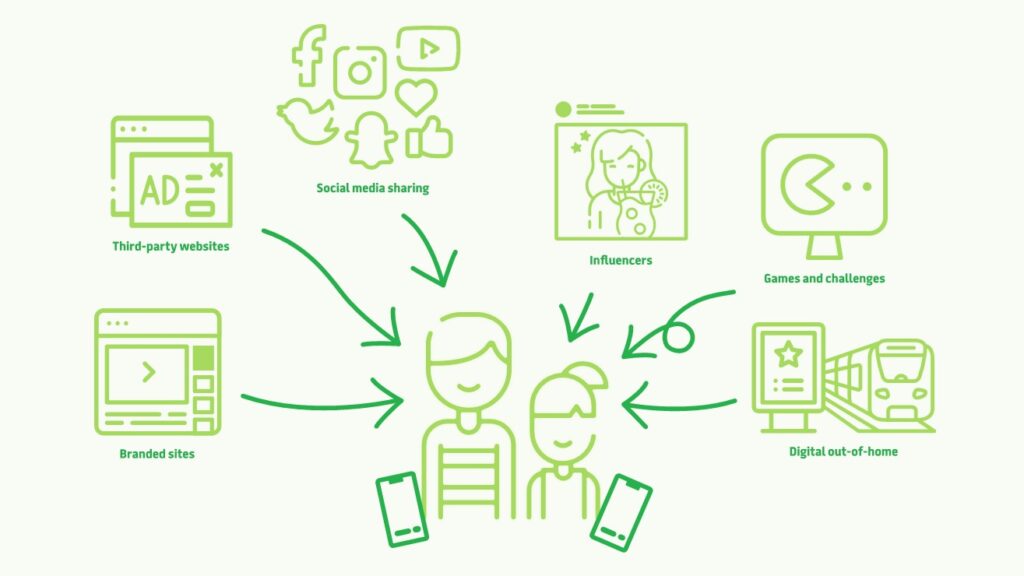Australia is falling behind the rest of the world in protecting kids from predatory digital marketing of harmful products like alcohol, unhealthy food and gambling, according to a new report released today.
The Under the Radar report from VicHealth, the Foundation for Alcohol Research and Education (FARE) and the Obesity Policy Coalition (OPC) reveals how the personal data of Australian children is under-protected and how data can be made available for harmful industries to target children with aggressive marketing tactics.
The report highlights that:
- during the coronavirus pandemic, 1 in 2 Australian children increased their time on screens and digital media for entertainment (online gaming, social media and watching video content), with 3 in 4 school-aged children spending more than 3 hours on screens each day
- an estimated 72 million data points will have been collected by companies on each child by the age of 13. This can be sold to marketers who can effectively target and attract each child
- according to Facebook monitoring, 740,000 children were interested in gambling, and a further 940,000 children were interested in alcohol products in 2018[i].
VicHealth CEO Dr Sandro Demaio said Australian kids are exposed to a range of covert marketing tactics by harmful industries from a young age.
"Unhealthy food, alcohol and gambling companies are constantly using innovative approaches to digital marketing, which can make it hard for both kids and adults to tell when something is an ad in disguise," Dr Demaio said.
"If kids get hooked on harmful products from a young age, they become consumers for life. Yet sneaky tactics like apps, advergames, influencer posts on social media and strategies to encourage content sharing among friends, all appeal to kids and are repeatedly used by harmful industries. We also know there's nothing stopping companies buying kids' data from digital platforms and using it to target them with marketing, essentially making our kids the product.
"The consequences of this could be lifelong, determining the habits kids form and putting them at risk of developing heart disease, stroke and cancer later in life."
During the coronavirus pandemic, Australian children have spent more time online to learn, play and connect, but there's also been a rise in targeted digital marketing. This combination has created the perfect storm, exposing our kids to more harmful marketing than ever before.
OPC Executive Manager Jane Martin said kids should be free to enjoy digital media without being exposed to any unhealthy food and drink marketing, including marketing that targets them directly.
"We know that processed food companies use children's data to target them with digital marketing for unhealthy food. Kids are seeing promotions for unhealthy food on TikTok, Instagram, Facebook and YouTube, often without realising that it isn't entertainment," Ms Martin said.
"Marketers can collect information about a child's age, gender, interests, how they feel and where they live. This helps them understand how to best engage and influence children in the short term, and keep them as consumers into adulthood.
"The digital environment in which they spend several hours each day should be protective, but in Australia this is far from the reality."
FARE Chief Executive Officer Caterina Giorgi said Australia must urgently act to protect children from the digital marketing of harmful products.
"In Australia, the limited framework governing the digital advertising of harmful products that children are exposed to is industry-designed and industry-led, and it does little to protect our kids. These industry codes prioritise industry profits and there are little to no sanctions when companies break the rules," Ms Giorgi said.
"Countries such as Finland, France, Chile, the UK and Italy have taken steps to restrict or ban the promotion of alcohol, unhealthy foods, or gambling online.
"The vulnerability of children means their online privacy should be tighter than for adults, but in Australia this is not the case.
"We must urgently act to put children's health and safety above the profits of harmful industries."
Australia must urgently act to protect children and their personal information from harmful digital marketing
VicHealth, FARE and the OPC are calling for strong, evidence-based policies and government regulation to ensure:
- children are protected from digital marketing by harmful industries
- children's data is better protected, so harmful industries can't use it to target them with marketing
- social media influencers with large followings of children cannot promote harmful products
- harmful industries report how much they spend on digital marketing each year, how they collect and use personal information and how they target people via digital marketing.
Harmful digital marketing and its effects: Key stats
- Over half (55%) of Australian 11-16-year-olds recall seeing gambling advertisements on social media.
- 97.7% of the social casino games available for download on Android have an age rating of 12+ or younger.
- Exposure to alcohol marketing increases young people's consumption and increases the chances that they will start to drink at a younger age.
- 38% of YouTube ads are for food and beverages - the majority of which are unhealthy products.
- 1 in 4 celebrity endorsements of products on social media are for unhealthy foods - and children are more likely to share these posts than posts for healthier products.
What are other countries doing to protect kids online?
- Finland has restricted alcohol advertising on social media.
- Italy has banned gambling advertising.
- In France, alcohol brands can only advertise certain specified elements about alcohol products, such as the origin of the product, its ingredients and how it's made, and a health message must accompany the ads.
- Chile has restricted marketing of unhealthy food across media platforms including online.
The UK has announced its intention to ban the marketing of unhealthy foods online by 2022. The UK also has an age-appropriate design code to protect children from unhealthy marketing.
How are Australian kids exposed to harmful marketing online?







